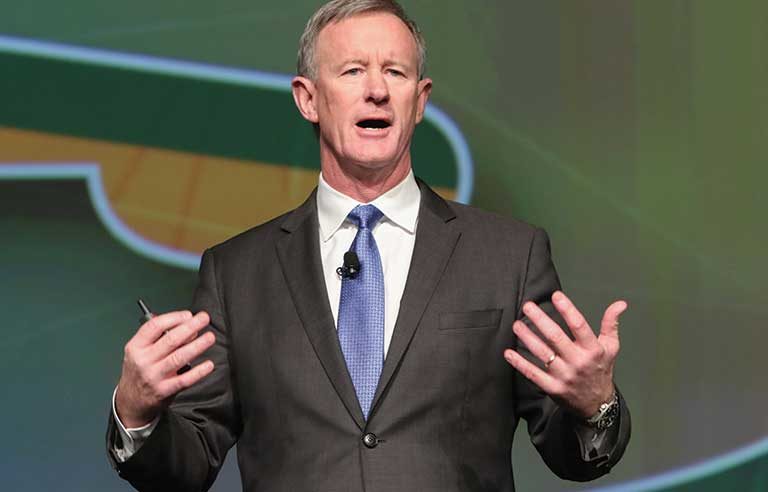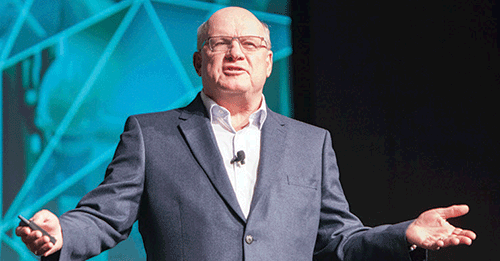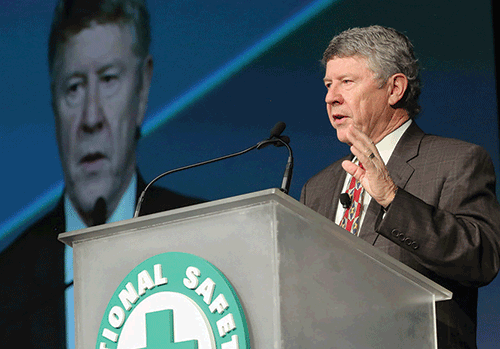A look back at the 2018 NSC Congress & Expo

‘Safety 3’: The evolution of – and challenges for – safety

Understanding risks and relying on human intelligence instead of only technological advances likely will play significant roles in the future of safety, SAFEmap International CEO Corrie Pitzer said Oct. 23 during the Leadership Keynote.
However, he added: “In safety, we don’t know what we don’t know.”
Pitzer guided the audience on a journey through different evolutions of safety and what he called “Safety 3,” coming sometime in the next 15 to 20 years.
In every evolution, safety professionals can hit a wall, he said. In the case of “Safety 2,” that wall is the increase in on-the-job fatalities over the past three years.
One of the root causes, Pitzer said, is that we are “paralyzed by protection.”
“Our employees don’t understand risk because we protect them,” Pitzer said. “They have to get back to understanding risk.”
Although technology such as driverless cars could mitigate some risk, it also might allow people to turn off their brains, Pitzer said, noting that “technology will never have a heart and never make the moral choice.”
For example, he showed a slide of a company potentially ready for the forthcoming changes. That organization used goals such as looking beyond numbers (i.e., total recordables), focusing on “high consequence” harm/potential, and understanding that people are the strongest link.
The passion for safety remains a strong tool, Pitzer said, and “will take us into the future.”
‘The unpredictability of storms’ and other lessons learned from Hurricane Harvey

Before Hurricane Harvey came ashore in August 2017 in Harris County, TX, its ferocity was not a constant.
When hurricanes form, “we have a 120-hour window” to get people out, said fomer Harris County Judge Ed Emmett, who presented the Occupational Keynote on Oct. 24. “Harvey was a hurricane, then it came across [Mexico’s] Yucatan Peninsula and dissipated, went back to a tropical storm and nobody was worried,” said Emmett, who also serves as the county’s director of homeland security and emergency management. “Then, within 48 hours, it was a Category 4 hurricane. For six nights, it was brutal.”
According to the Harris County Flood Control District website, the county’s maximum rain measurement for seven days during Harvey was 47.4 inches, and more than two dozen rain gauges around the county measured at least 40 inches.
The unpredictability of storms such as Harvey was one of the key lessons Emmett and his team learned. The first, and perhaps most important, lesson Emmett shared was the need for constant communication.
“Communication between all the groups involved (is important),” he said. “Communication among the city, county, state, the Red Cross and everybody is vital. What’s more vital is the communication to the public. The public has to know what is going on.”
With a major disaster, media coverage and failures of various agencies can cause hurdles. Emmett said it’s important for teams to avoid such distractions. “When you’re in the midst of a crisis, you need to be solving the crisis,” he said.
During most emergency situations, Emmett believes in letting trained team members do their jobs and empowering them to make decisions. “Don’t let them be afraid of doing their job,” he said.
Whether it is working with his staff, other agencies or the public, Emmett said people are the most important factor.
“In the end, it always comes back to people,” he said. “How we respond to a crisis comes back to people – us, the people who work for us and the people we serve.”
Some of the most rewarding work he has done, Emmett said, has been dealing with emergencies.
“You all understand safety,” he told the audience. “That’s your life.
Post a comment to this article
Safety+Health welcomes comments that promote respectful dialogue. Please stay on topic. Comments that contain personal attacks, profanity or abusive language – or those aggressively promoting products or services – will be removed. We reserve the right to determine which comments violate our comment policy. (Anonymous comments are welcome; merely skip the “name” field in the comment box. An email address is required but will not be included with your comment.)

